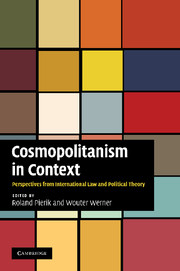Book contents
- Frontmatter
- Contents
- 1 Cosmopolitanism in context: an introduction
- Part I Environmental protection
- Part II World Trade Organization
- Part III Collective security and intervention
- Part IV International Criminal Court
- Part V International migration
- 10 Is immigration a human right?
- 11 A distributive approach to migration law: or the convergence of communitarianism, libertarianism, and the status quo
- Part VI Conclusion
- Index
- References
11 - A distributive approach to migration law: or the convergence of communitarianism, libertarianism, and the status quo
Published online by Cambridge University Press: 06 December 2010
- Frontmatter
- Contents
- 1 Cosmopolitanism in context: an introduction
- Part I Environmental protection
- Part II World Trade Organization
- Part III Collective security and intervention
- Part IV International Criminal Court
- Part V International migration
- 10 Is immigration a human right?
- 11 A distributive approach to migration law: or the convergence of communitarianism, libertarianism, and the status quo
- Part VI Conclusion
- Index
- References
Summary
In this chapter, I will argue that the debate about cosmopolitanism vs. sovereignty can only be considered as a relevant debate if the wrong questions are asked – at least in my field of expertise, migration law. The question which is at the heart of this debate in migration law (under which circumstances should aliens be admitted) is a false one. In my view, the issue is not the just distribution of membership. Instead, the debate is mostly about the position of aliens who are in the community already, and whom the community prefers to consider as non-members, or even as non-entities. If it would be acknowledged that the aliens whose position is being discussed are already in the community, it would become clear that their position can either be debated under the rubric of admission, or under the rubric of redistribution. The obsessive way in which the redistribution option is ignored suggests that the (ideological, material, and/or other) stakes for debating migration under the admission rubric are high.
I will start out by sketching very briefly two poles of the debate, namely the communitarians who defend State sovereignty, and the libertarians who defend a basic human right of international migration. At first sight, the libertarians seem to be the real cosmopolitans, because they criticize migration control because it leads to a situation in which the interests of foreigners carry less weight than those of nationals.
- Type
- Chapter
- Information
- Cosmopolitanism in ContextPerspectives from International Law and Political Theory, pp. 249 - 274Publisher: Cambridge University PressPrint publication year: 2010
References
- 1
- Cited by



